60% of Israelis say war goals achieved against Iran - poll
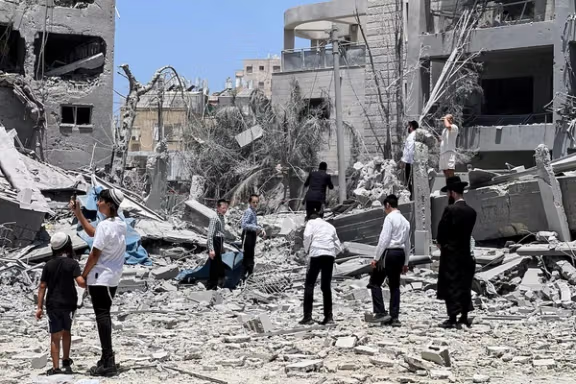
According to latest data from the Israel Democracy Institute, nearly two thirds of Israelis said they felt the country had achieved its goals in the 12-day war on Iran.

According to latest data from the Israel Democracy Institute, nearly two thirds of Israelis said they felt the country had achieved its goals in the 12-day war on Iran.
After the 12-day war which saw 15,500 Israelis displaced and 28 dead, respondents were asked, “In your opinion, did Israel achieve its goals in the war against Iran?”
The majority of Jews, 60%, think that Israel achieved most or all of the goals it set for itself when it launched surprise attacks on Iran on June 13.
However, there were large differences between Jews and the country’s 20% Arab population, of whom only 37% said they agree.
The survey, published by the independent think-tank on Monday, was based on a representative sample of the population in Israel aged 18 and above, comprising 603 Jewish interviewees and 150 Arab interviewees.
The majority of Jewish Israelis had backed war with Iran, but in the wake of the operation which saw more than 450 ballistic missiles fired at the Jewish state, reflections on the operation’s enduring success continue.
US President Donald Trump says that Iran’s nuclear program was “obliterated” by American strikes on Iran's three key nuclear facilities which took place after Israel destroyed swathes of Iran's military infrastructure.
The war left over 1,100 Iranians dead and thousands more injured, according to rights group HRANA.

Iran International confirmed on Tuesday that recently published materials from the hacked Telegram accounts of its journalists are linked to two separate cyberattacks carried out in the summer of 2024 and January 2025.
“The hackers may have accessed the computers of affected colleagues by installing malware via their compromised Telegram accounts. These incidents have been addressed as part of our continuing work with the relevant security authorities,” read a statement by the channel.
Earlier on Tuesday, Iranian state outlets published screenshots from internal Telegram chats linked to Iran International.
The attacks were carried out by the cyber group known as Banished Kitten (also referred to as Storm-0842 and Dune). The group operates under the Cyber Threat Countermeasures Unit of the Domestic Security Directorate of Iran’s Ministry of Intelligence, under the supervision of Yahya Hosseini Panjaki, whose
identity was first exposed by Iran International.
"These cyberattacks are part of a broader campaign of threats targeting Iran International, including physical threats against our staff," the statement added.
"As a news organization committed to independent journalism, we implemented the necessary measures following these incidents to protect our staff and audiences," it said.
"We remain resolute in our mission to deliver accurate, uncensored news to our audience, and we will not allow these threats—online or offline—to disrupt our work. These attempts to intimidate us will not succeed," the channel added.
Iran International is a Persian-language TV news network that broadcasts 24/7 and has a strong following in Iran, despite government efforts to restrict access to the internet and satellite signals. Tehan has labelled it a terrorist organisation.
Iran International has previously been the subject of threats and attacks. In 2023, a man was convicted under terrorism laws after filming outside its premises, and in 2024, Pouria Zeraati, the television host of the "Last Word" program on Iran International was stabbed in London.
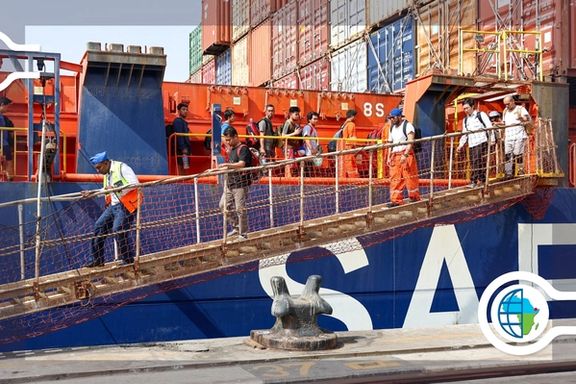
Two seamen are believed to have been killed and another two missing after an attack on a Greek-managed cargo ship off the coast of Yemen by the Iran-backed Houthis, according to Reuters.
This brings the death toll to six since the group began its maritime attacks in support of Iran-backed Hamas in Gaza in November 2023.
The attack came just hours after the group, which many Western countries have listed as a terrorist organization, claimed to have sunk a bulk carrier in the Red Sea.
According to the European Union’s Operation Aspides task group specializing on protecting shipping in the Red Sea region, the attack happened 50 nautical miles southwest of the port of Hodeidah.
The vessel, which was Liberia-flagged, had 22 crew members, 21 Filipinos and one Russian, as well as armed guards on board.
It was attacked with sea drones and rocket-propelled grenades fired from manned speedboats, sources said.
An official from Cosmoship Management, which manages the vessel, told Reuters that the vessel's bridge was hit and telecommunications were impacted.
While crew were told to abandon after it suffered serious damage, the lifeboats had been destroyed in the assault.
On Monday, the Houthis had claimed responsibility for sinking the MV Magic Seas, for what the spokesman for the group said was “repeated violations by its owning company of the ban on entering the ports of occupied Palestine.”
The raid involved gunfire and rocket-propelled grenades from eight skiffs as well as missiles and four uncrewed surface vessels.
The statement also warned: “We are not satisfied with sinking just one ship, there is more to come.”
While the Houthis said the group had sunk the ship, Michael Bodouroglou, a representative of Stem Shipping, one of the ship's commercial managers, said there was no independent verification, according to Reuters.
If proven to have been sunk, it would make it the third ship to be sunk since November 2023 when the group began the blockade, following a call by Iran’s Supreme Leader Ali Khamenei.
On Sunday morning, Israel announced it had struck multiple Houthi targets.
In May, the US made a ceasefire with the group after at least 174 attacks on US warships, in addition to the group's more than 145 attacks on commercial vessels, as of March figures. That ceasefire did not include other nations.
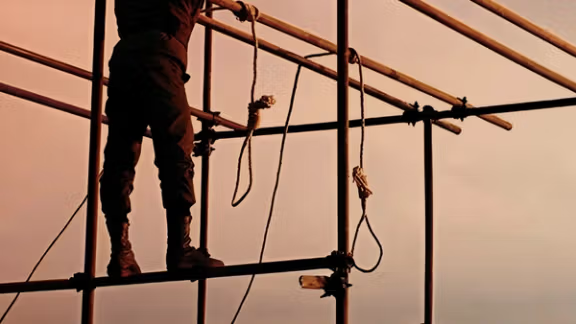
A media outlet affiliated with Iran’s Revolutionary Guards (IRGC) has openly called for the mass execution of perceived enemies of the state, invoking the precedent of mass killings carried out in 1988 following a decree by then-Supreme Leader Ruhollah Khomeini.
In an article published this week, the semi-official Fars News Agency described current detainees accused of collaborating with Israel and Western intelligence agencies as “deserving of execution in the style of 1988.”
“In the current conditions, when some mercenary elements—Iranians and foreign nationals—have enabled the killing of hundreds of Iranian citizens, including women, children and civilians, by transferring intelligence to the Zionist enemy and smuggling weapons into the country, they deserve to be executed in the manner of 1988," the article said.
The publication argued that the 1988 executions were a “brilliant chapter” in the Islamic Republic’s fight against terrorism and said that “society today recognizes the need for such proper measures against domestic terrorist networks.”
Between July and September 1988, thousands of political prisoners were summarily executed across Iran after a fatwa by Ayatollah Khomeini.
Amnesty International estimates the death toll at a minimum of 5,000. Victims, many of whom had already been serving sentences for political dissent, were subjected to secret trials and then executed. Their bodies were buried in unmarked graves, and families were never officially notified.
“The anguish caused to families by this ongoing crime constitutes torture,” Amnesty said in a 2023 report, adding that “the extrajudicial executions and the ongoing enforced disappearances amount to crimes against humanity.”
The Iranian authorities have never acknowledged the full scope of the killings. Families of the victims have been subjected to intimidation, denial of burial rights, and the destruction of mass grave sites. Amnesty International and other human rights groups continue to call for accountability.
In 2016, an audio recording surfaced in which Grand Ayatollah Hossein Ali Montazeri, once heir apparent to Khomeini, condemned the executions in a meeting with judiciary officials involved in the process. “I believe the greatest crime in the history of the Islamic Republic, for which history will condemn us, has been committed by you,” he said. “Your names will go down in history as criminals.”
Montazeri was subsequently dismissed from power and placed under house arrest until his death in 2009.
Calls for renewed repression
In its editorial, Fars revisited the history of the 1980s and described dissident organizations such as the Mojahedin-e Khalq (MEK) as armed insurgents who “attempted to hijack the revolution from within.”
The article said the MEK collaborated with Iraq during the Iran-Iraq war and “committed atrocities against civilians,” framing the 1988 executions as both justifiable and necessary for national security.
“Unlike the false portrayal by opposition media that the 1988 executions were against human rights, today the public sees the necessity of repeating such decisive actions,” Fars wrote, also defending the role of late President Ebrahim Raisi, who was one of the judiciary officials implicated in the process.
Iran is intensifying a nationwide crackdown in the wake of its 12-day war with Israel, targeting ethnic and religious minority groups as well as foreign nationals.
Late in June, Fars reported that Iranian intelligence forces arrested more than 700 Iranians accused of acting as agents for Israel.
No Iranian official has yet responded to or repudiated Fars’ latest statements. Iranian authorities typically avoid direct acknowledgment of the 1988 killings in public discourse, though some judiciary and government figures have repeatedly defended them as lawful.
Iran’s parliament passed an emergency bill late last month to increase penalties for espionage and collaboration with “hostile states,” allowing suspects to be tried under wartime conditions.
Judiciary chief Gholamhossein Mohseni-Ejei said those arrested in the context of Israel’s recent attacks would be prosecuted under “wartime legal provisions.”
Judiciary spokesperson Asghar Jahangir said on state TV that current espionage laws are “too general” and inadequate for addressing recent cases, adding that legal reforms are needed to handle detainees linked to the conflict with Israel.
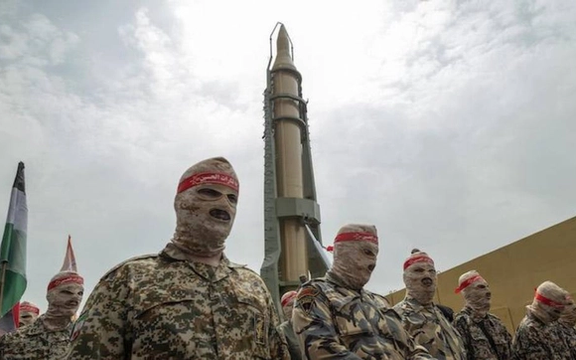
In the last five years, Iran has stepped up its involvement in global terrorism, according to new research by the Institute for National Security Studies (INSS), an Israeli think-tank.
“Over the past five years, Iran’s activity in the arena of international terrorism has significantly intensified, spreading across vast geographic regions and incorporating criminal organizations in the execution of terrorist operations,” read the paper led by counter-terrorism expert Yoram Schweitzer.
“Although most Iranian terrorism attempts have been thwarted, there is no guarantee that this success will persist in the future.”
It comes as the UK parliament's Intelligence and Security Committee has just produced a report saying that Iran remains one of the country’s biggest foreign threats on domestic soil, as reported by The Telegraph, highlighting the targeting of Iranian dissidents in the UK and cyber attacks aimed at UK companies.
Last year, the head of Britain’s MI5 intelligence service also said Iran remains one of the country’s biggest foreign threats.
Arrests of people accused of involvement in alleged Iran-backed attacks have happened in countries around the world from Azerbaijan to Greece, and have stepped up since the Gaza war.
Last year, the European Parliament said: "The Iranian regime’s use of criminal networks as terrorist proxies in Europe poses a grave threat to our internal security."
Plots targeting Israelis abroad have also been exposed in countries such as Cyprus, Turkey and Georgia.
“An analysis of Iran’s terrorism policy reveals a troubling trend, illustrating that Iran remains committed to employing international terrorism and is even amplifying its efforts in this regard, demonstrating a willingness to risk friction with numerous states in order to pursue its policy,” the INSS report said.
The researchers said Iran has become more confident “in violating international norms” with most operations abroad carried out under the responsibility of the Islamic Revolutionary Guard Corps (IRGC), specifically the foreign branch known as the Quds Force, and the IRGC Intelligence Organization. Other attacks have fallen under the Iranian Ministry of Intelligence.
Last year, the European Parliament once again called to add the IRGC to the list of terrorist organizations, following the likes of the US and Canada.
"Iran’s hostile activities abroad are not a new phenomenon. The European Parliament has repeatedly called for the EU to take action against the Iranian regime, including by adding the Islamic Revolutionary Guard Corps to the EU terrorist list," a statement in October said.
The INSS paper also pointed out Iran's use of its military allies such as Hezbollah in Lebanon, and criminal organizations.
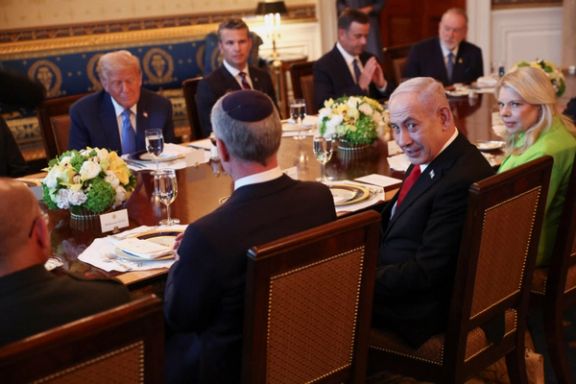
US President Donald Trump said on Monday that Iran has requested negotiations with Washington and expressed his willingness to lift sanctions “at the right time.”
“I would love to be able to take those sanctions off and give them a chance,” Trump said during a White House dinner with Israeli Prime Minister Benjamin Netanyahu. “They want to meet and make peace. We have scheduled Iran talks. They want to talk.”
US Special Envoy to the Middle East Steve Witkoff told reporters that nuclear negotiations between the two countries are expected to take place “in the next week or so,” in what would mark the first official diplomatic engagement between Washington and Tehran since the 12-day conflict between Iran and Israel.
Iranian Foreign Ministry spokesperson Esmail Baghaei on Tuesday denied that Iran had requested a meeting with the American side."No meeting request has been made to the American side from our end."
Trump, speaking to reporters before the dinner, said Iran had “taken a big drubbing” from joint US-Israeli strikes but now appeared ready for dialogue. “I hope the war with Iran is over,” he added.
When asked for a specific date for the talks, Trump declined to provide details. “I’d rather not say, but you’ll be reading about it tomorrow or seeing it tomorrow,” he said.
Iranian President Masoud Pezeshkian said this week that he believes Iran can resolve its differences with the United States through dialogue, but trust would be an issue after US and Israeli attacks on Iran.
"I am of the belief that we could very much easily resolve our differences and conflicts with the United States through dialogue and talks," Pezeshkian told conservative US podcaster Tucker Carlson in an interview released on Monday.
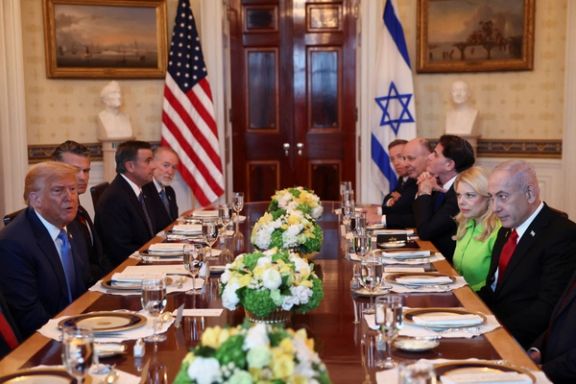
The US president also spoke warmly about the Iranian potential. “They have the oil power. They have great people, smart people, energetic people—amazing,” he said.
“I would like to see Iran build itself in a peaceful manner. They were the bully of the Middle East and now they are not any more.”
During the dinner, Netanyahu said that Iran’s influence in Syria had waned and described the Islamic Republic as "out of the picture" there, suggesting that this shift could open the door for a new peace process between Israel and Syria. He also told Trump he intended to nominate him for the Nobel Peace Prize.
Trump said that Netanyahu had asked for US sanctions on Syria to be lifted—a request that Trump said was granted. “We took the sanctions off because we want to give them a chance,” he said, adding that similar relief could be considered for Iran if progress is made.
Mehrzad Boroujerdi, a US-based Iran analyst, said that the dinner remarks exposed a gap between American and Israeli positions on Iran.
“Netanyahu has never accepted any form of negotiation with Iran and has consistently advocated for the destruction of its nuclear program,” Boroujerdi told Iran International. “His comparison of Iran’s nuclear and missile ambitions to ‘cancerous tumors’ shows he seeks perpetual control over Iran’s military activities.”
However, he said that Trump’s remarks reflect a more pragmatic view from the White House. “Trump is entering these talks from a position of strength,” he said. “This isn’t about appeasement—it’s about leverage.”
The dinner was Netanyahu’s first in-person meeting with Trump since the strikes on Iran.